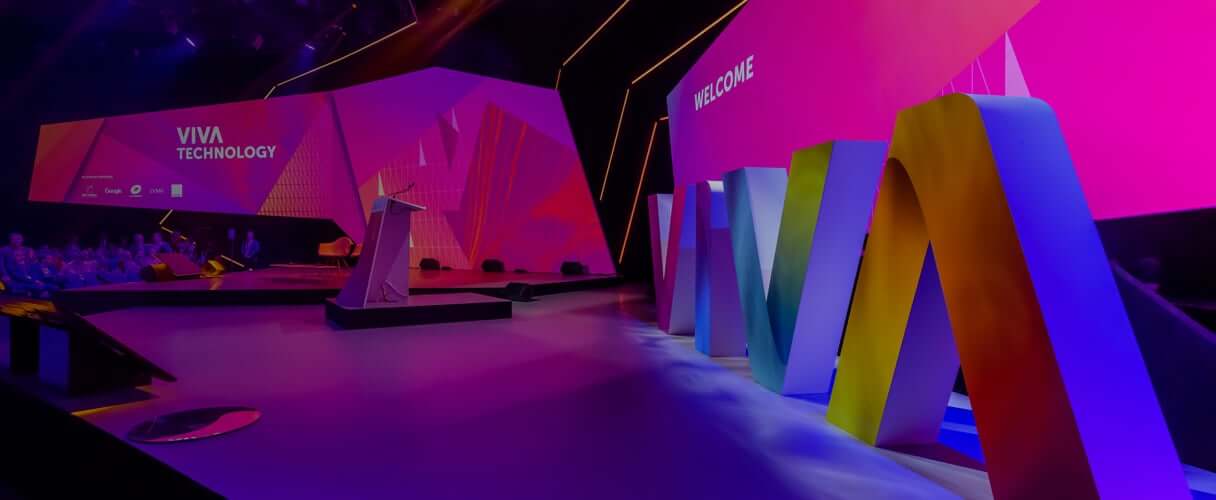Want a heads up when a new story drops? Subscribe here.
Many professionals are still not ready to consider travel and in-person events despite the fact that they did a fair amount of travel before the pandemic. Yet, they miss interacting with colleagues and friends on a personal level and the opportunity to exchange ideas, brainstorm, collaborate and commiserate. It has been a long solitary year of working remotely, no business or leisure travel, separation from colleagues and friends, and Zoom calls. The era of hybrid events has commenced.
Table of Contents
Hybrid Events- Somewhere between Face-to-Face & Virtual Events
The health crisis has led to dramatic disruptions and small losses like not being able to share experiences and spaces with others. While virtual events have allowed us to chat, gain new insight, and hear from industry peers, there is nothing like the experience you get from striking a conversation with someone and creating a real connection with people.
Event planners have done their best to offer virtual experiences that are as impactful as in-person events. However, they simply cannot replicate the dynamic. We are all eager to travel, learn, collaborate, and meet new people. Yet, this will take some time. Time will pass before the hospitality and transport sectors recover and we remake and rebuild the world as we know it.
The future of events is hybrid at least for the years to come. Hybrid experiences offer flexibility, convenience, and the opportunity to connect with a broader audience. The truth is, however, that many are still trying to master the art of organizing a successful, impactful hybrid event.
Here are some of the key success factors, platforms, and lessons learned from hosting hybrid events.
Key Success Factors for Hybrid Events
Hosting a hybrid event involves bringing together a small number of delegates in a live environment while being attended by interactive audiences through web streaming technology. When hosting an event with virtual and in-person elements, key considerations are timing, venue, platform, and your audience.
Attendees Friendly Hybrid Events
For starters, you want to make sure that the start time for your hybrid event is friendly to as many attendees and time zones as possible. This may mean scheduling the sessions differently and having a keynote speech late in the afternoon rather than early in the morning.
Offering the same session multiple times is also a great idea but it is not always possible. Make sure the sessions can be accessed on-demand to accommodate your virtual attendees.
Appropriate Venues for Hosting Hybrid Events
Next, think of the kind of venue that will work best in terms of access, seating, number of attendees, and safety. Check the local vaccination coverage and community transmission, the public transport links, and how far the nearest hospital is.
There will be so much to consider when planning, including the infrastructure you need, access to the venue, and any existing hazards such as buried services and overhead power lines. Potential hazards to consider are:
- Weather
- Crowd management
- Security threats
- Catering
- Fire hazards
- Child protection
- Environmental
The Right Equipment to Hybrid Events
You also need to give the event a polished feel which makes things like sound quality, camera angles, video displays, space, and venue design all the more important. You need a venue that has the infrastructure and technological and digital capabilities to support a virtual experience.
To live stream the event, you will need essentials like microphones, cameras, tripods, video encoder, network switches, and a streaming destination /platform/.
There is a wealth of platforms available such as Facebook Live, YouTube, Wowza, and Kaltura where streaming can be free or paid, public or private, and convert to on-demand or stream-only.
All the major platforms support options such as interactive workshops, audience chats, Q&A sessions, live polls, and free handouts. Popular integrations are also embedded surveys, social media streaming, interactive expo areas, and self-service speaker dashboards.
When it comes to technology choices, Zoom takes first place with 50.3 % of usage. Microsoft Teams comes in second with 12 %, followed by Facebook Live (9.4 %), GoToWebinar (5.8%), YouTube Live (5.2 %), On24 (4.7 %), and WebEx (1%).
Whether hosting an in-person event, through an online platform, or a hybrid experience, you will want to find out how well your event performed. Consider metrics such as attendee engagement and retention, registration, app, and online visits, revenue, and social media metrics.
The State of the Virtual Events 2021 report also highlights the need to use metrics such as brand conversion and net promoter score.
According to the report, metrics that matter to event organizers are engagement number with 45% attendee satisfaction (24.9%), revenue (14.8%), social engagement (7.9%), and other (7.4%). Common challenges that respondents face are tracking attendance, demonstrating impact, identifying suitable KPIs, and content creation.
Tip: Hundreds of growing businesses use Socialfix to create awesome hybrid events and showcase their products.

Major Virtual and Hybrid Events during Covid-19
AWS re: Invent 2020

An annual conference hosted by Amazon Web Services, last year’s edition was virtual-only due to pandemic-related concerns. Featuring multiple training and leadership sessions, product launches, and keynote speakers, AWS announced new services, improvements, and features.
Experts in the field of cloud transformations, data warehousing, and systems engineering discussed new developments impacting machine learning, networking and IoT, storage, database, and computing.
New machine learning features and products were showcased, among which SageMaker Managed Data Parallelism, SageMaker Feature Store, and SageMaker Clarify. A new exciting capability and repository for machine learning features, Amazon’s SageMaker Feature Store allows users to store, organize, name, and access features across teams.
Other products announced during the conference are Amazon Monitron, a new system to detect abnormalities in industrial equipment, AWS Trainium, a next-gen chip to train machine learning models, and AWS Panorama, a software development kit with computer vision capabilities to detect manufacturing defects.
The Digital Experience Conference

Organized by Adobe Systems, this conference is a major event with hundreds of sessions and keynote speakers. The first online edition attracted more than 100,000 participants and turned out a huge success.
The conference featured over 100 sessions with a focus on data insights to enhance the customer experience, customer data management practices, marketing integrations and automation, and demand generation during Covid-19.
The 2021 digital edition featured a diverse program around topics such as personalization, digital document productivity, the developer ecosystem, and content creation. With multiple workshops, sessions, and keynotes, registrants had the opportunity to gain insights into the latest innovations, participate in special activities and giveaways, network with peers, and hear success stories from major brands.
Adobe’s conference is also one of the events where participants can master new skills and learn about new technology and products and the latest trends.
Viva Technology Conference

Held physically and personally, VivaTech is Europe’s largest tech and startup event to celebrate innovation and tomorrow’s opportunities. The conference brought together over 100,000 delegates. Industry leaders such as Apple SEO Tim Cook, Zoom CEO Eric Yuan, co-founder of Facebook Mark Zuckerberg, and Microsoft President Brad Smith, attended the event.
This year’s edition is a hybrid event. It has multiple events and attendees from 149 countries. Participants had the chance to hear top industry leaders talking live, access replays, and join events and gatherings that took place on 3 continents.
A conference is also a place for networking and business opportunities. About 77 % of attendees are C-level and 79 % of startup companies meet potential investors. Some of the intriguing topics at the conference are cybersecurity for startups, data intelligence, innovation for the smart city, and ethical AI for talent management.
Hybrid Events: Unravelling New Opportunities
For obvious reasons hybrid events offer cost savings to organizers and are an affordable alternative for attendees. The cost of hosting an in-person event is higher. It needs budgets for production teams, equipment rental, and physical venues, as well as entertainment, accommodation, food, and transportation.
Hybrid events also offer more marketing opportunities for brands than in-person and virtual experiences. They can share both printed and digital brochures, showcase physical merchandise, and ship care packages to attendees.
The best part about hybrid experiences is that brands benefit from virtual and physical events happening at the same time. A curated live experience offers opportunities for collaboration, networking, and meeting new prospects. As hybrid events also have a digital component. They are not limited to a specific location. That allows brands to reach out to a wider audience across geographic boundaries.
Hybrid experiences also attract more industry leaders and not just attendees. We have already seen events with a blend of speakers, with some attending in-person while others joining in remotely.
Attending events in person offers the opportunity to network with industry professionals, share insights, and gain recognition. Those who cannot afford to travel long distances to attend a physical event are offered the option to join remotely.
A further benefit for organizers and attendees is event longevity. Participants can access on-demand content such as speaker information, resources, and recordings of the event. On-demand content improves brand recall and audience engagement.
Hybrid Events Statistics
Having experienced the many benefits that digital experiences can bring, the future of events is a most likely hybrid. The shift to digital has presented an opportunity. It’s beneficial for brands, organizations, and individuals to exchange ideas, learn new things, and make connections.
It is not surprising that many prefer to attend a virtual event at the moment. A poll by Qualtrics reveals that 59 % of people prefer digital over in-person experiences and 29% expect to attend one within the next year. Only 12 % of respondents say they are willing to travel internationally to join an in-person event.
Preference for live and digital experiences varies by region in 2021 and beyond. 57 % of Americans prefer live events compared to 69 % of Europeans. This clearly shows the need for local and regional strategies to meet audiences’ expectations. There are even differences when it comes to the most popular day to attend an event. It is Wednesday in the U.S. and Friday in Latin America, the Middle East, and Europe.
Consumer expectations will also have an important impact on the types of events available. A recent survey by The 614 Group asked U.S. marketing professionals about the types of events they expect post-Covid-19. The respondents were looking for hybrid events to help with- digital community building, live video feeds, VR, and AR experiences for product launches.
Going Forward
In a post-Covid world, the focus will also be on integrated experiences. Those will allow attendees to join on their own terms. If they prefer to attend in person, they will have the opportunity to do so.
If an in-person event doesn’t fit their schedule, streaming on-demand will allow them to catch up later on sessions. And if digital experiences are more their speed, there will be a wealth of events to join.
Enthusiasm to return to pre-pandemic life and digital adoption during Covid-19 will allow both digital and in-person experiences to thrive. Event organizers underwent a massive learning curve and now have a better understanding of how digital experiences can benefit audiences.
Virtual and in-person events will be happening at the same time in the near future. This model allows for cross networking between virtual and live audiences via discussion boards, Q&A sessions, polls, and mobile chat.
Event hosts can choose how to engage virtual and in-person attendees and what they show to both audiences. Pre-recorded sessions may only be available to online attendees while in-person sessions may be reserved for live audiences. Likewise, exhibitors may be allowed to host a virtual or in-person booth or both.
In Summary
Finally, it is clear that the boundaries between the physical and digital worlds have become blurred. This fading of boundaries has important implications for the events industry. The points of intersection between digital and physical allow for a smooth crossing between both spaces. It is essential that event planners find ways to connect live and virtual audiences.











